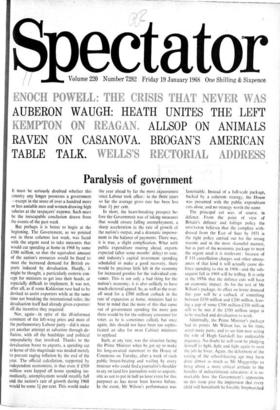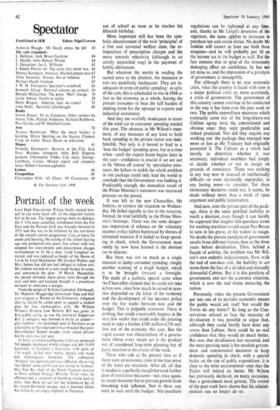Paralysis of government
It must be seriously doubted whether this country any longer possesses a government —except in the sense of over a hundred more or less amiable men and women drawing high salaries at the taxpayers' expense. Such must be the inescapable conclusion drawn from the events of the past week.
But perhaps it is better to begin at the beginning. The Government, as we pointed out in these columns last week, was faced with the urgent need to take measures that would cut spending at home in 1968 by some £500 million, so that the equivalent amount of the nation's resources would be freed to meet the increased demand for British ex- ports induced by devaluation. Hardly, it might be thought, a particularly esoteric con- cept for ministers to get into their heads, or especially difficult to implement. It was not, after all, as if some Kaldorian ruse had to be devised to assist exporters while at the same time not breaking the international rules; the devaluation itself had already given exporters all the incentive they required.
Nor, again—in spite of the ill-informed comment of the left-wing press and most of the parliamentary Labour party—did it mean yet another attempt at salvation through de- flation, with all the hardships and political unpopularity that involved. Thanks to the devaluation boost to exports, a spending cut at home of this magnitude was needed merely to prevent raging inflation by the end of the year. The official calculation, supported by independent economists, is that even if £500 million were lopped off home spending im- mediately, unemployment would steadily fall and the nation's rate of growth during 1968 would be some 31 per cent. This would make the year ahead by far the most expansionist since Labour took office: in the three years so far the average gross rate has been less than 11 per cent.
In short, the heart-breaking prospect be- fore the Government was of taking measures that would ensure falling unemployment, a sharp acceleration in the rate of growth of the nation's output, and a dramatic improve- ment in the balance of payments. There was, it is true, a slight complication. What with public expenditure roaring ahead, exports expected (after some months' delay) to soar. and industry's capital investment spending scheduled to make a good recovery, there would be precious little left in the economy for increased goodies for the individual con- sumer. This is not only a bad thing for the nation's economy: it is also unlikely to have much electoral appeal. So, as well as the over- all need for a £500 million cutback in the rate of expansion at home, ministers had to bear in mind that the more of this that came out of government spending the more jam there would be for the ordinary consumer (or voter, as he is sometimes called), but once again, this should not have been too sophis- ticated an idea for most Cabinet ministers to applaud.
Such, at any rate, was the situation facing the Prime Minister when he got up to make his long-awaited statement to the House of Commons on Tuesday, after a week of such public breast-beating and wailing by every minister who could find a journalist's shoulder to cry on (and few journalists were so unpatri- otic as not to put in half an hour extra for this purpose) as has never been known before. In the event. Mr Wilson's performance was lamentable. Instead of a full-scale package. backed by a coherent strategy, the House was presented with the public expenditure cuts alone, and no strategy worth the name.
The principal cut was. of course, in defence. From the point of view of Britain's defence and foreign policy the SPECTATOR believes that the complete with- drawal from the East of Suez by 1971 is the right policy carried out for the wrong reasons and in the most shameful manner, but as part of the economic package to meet the urgent need it is irrelevant : because of F Ill cancellation charges and other annoy- ances of that kind it will actually cause de- fence spending to rise in 1968—and the sub- sequent fall in 1969 will be trifling. It is only in the 1970s that the defence cuts will have an economic impact. As for the rest of Mr Wilson's package, its effect on home demand this year will be a cutback of something between £150 million and £200 million, leav- ing a gap of some £300 million-£350 million still to be met if the £500 million target is to be reached and devaluation to work.
Admittedly, the Prime Minister's package had its points. Mr Wilson has, in his time, acted many parts, and to see him now acting the role of Hugh Gaitskell has undeniable piquancy. No doubt he will soon be pledging himself to fight, fight and fight again to save the job he loves. Again, the deferment of the raising of the school-leaving age may have done almost as much as Mr Muggeridge to bring about a more critical attitude to the benefits of indiscriminate education: it is re- markable how the Government's opponents on this issue give the impression that every child will henceforth be forcibly frogmarched out of school as soon as he reaches his fifteenth birthday. More important still has been the sym- bolic abandonment of the twin 'principles' of a free and universal welfare state, the re- imposition of prescription charges and the move towards selectivity (although in an utterly unjustified way) in the payment of family allowances.
But whatever the merits in sending the sacred cows to the abattoir, the measures in tow are manifestly inadequate. They are in- adequate in terms of public spending : in spite of the cuts, this is scheduded to rise in 1968 as fast as the economy as a whole, leaving the private consumer to bear the full burden of making room for the upsurge in exports and industrial investment.
And they are woefully inadequate in terms of the total cut in consumer spending needed this year. The absence, in Mr Wilson's state- ment, of any measures of any kind to hold back spending in the private sector was inde- fensible. Not only is it bound to lead to a 'beat the budget' spending spree, but at a time when—until the export boom begins later in the year—confidence is crucial if we are not to be 'blown off course' by speculative pres- sures, the failure to tackle the whole problem in one package could only lead the world to conclude that the Government was funking it. Predictably enough, the immediate result of the Prime Minister's statement was increased pressure on the pound.
It was left to the new Chancellor, Mr Jenkins, to retrieve the situation on Wednes- day. He failed signally to rise to the occasion. Instead, he trod faithfully in the Prime Mini- ster's footsteps. There was the same danger- ous impression of reliance on the voluntary incomes policy (albeit buttressed by threats of increased taxation if it failed) to keep spend- ing in check, which the Government must surely by now have learned is the shortest cut to disaster.
But there was not so much as a single measure to damp consumer spending; simply another warning of a tough budget, which is to be brought forward a fortnight. The nadir of a pathetic speech came when the Chancellor claimed that he could not take action now, since how much he raised in taxa- tion depended on the force of the.economy and the development of the incomes policy over the few weeks between now and the budget. This is palpable nonsense. There is nothing that could conceivably happen in the next few weeks that could undo the pressing need to take a further £300 million-£350 mil- lion out of the economy this year. But the vapid excuse was characteristic of a govern- ment whose every major act is the product not of considered long-term planning but of panic reaction to the events of the week.
Those who talk at the present time as if there were an economic crisis in the true sense of the word are mistaken. After all, all that is needed is a perfectly straightforward further dose of restrictive measures—not, once again, to create recession but to prevent growth from becoming wild inflation. Nor is there any need to wait until the budget : hire-purchase regulations can be tightened at any time, and, thanks to Mr Lloyd's invention of the regulator, the same applies to increases in purchase tax and excise duties. No doubt Mr Jenkins will sooner or later use both these weapons—and he will probably put 3d on the income tax in the budget as well. But the fact remains that in spite of the immensely damaging effect on confidence, he has not yet done so, and the impression of a paralysis of government is inescapable.
For although there is no true economic crisis, what the country is faced with now is a major political crisis or, more accurately, a crisis of government. The government of this country cannot continue to be conducted in the way it has been over the past week or two. The public expenditure measures which eventually came out of the long-drawn-out Cabinet agony were the conventional and obvious ones: they were predictable and indeed predicted. Nor did they require any working out: the package that emerged was more or less as the Treasury had originally presented it. The Cabinet as a whole had merely to determine whether it was necessary; individual members had simply to decide whether or not to resign on grounds of conscience. There was nothing in any way new or unusual or intellectually difficult—or even electorally unpopular, in any lasting sense—to consider. Yet these elementary decisions could not, it seems, be made without more than a week of open argument and public lamentation.
And now, over the private part of the pack- age, there is the same petrified inability to reach a decision, even though it can hardly be supposed that tougher hire-purchase terms for washing machines would cause Nye Bevan to turn in his grave, or his widow to resign. No doubt the present paralysis of government results from different factors than in the three years before devaluation. Then, behind a façade of activity, the problem was Mr Wil- son's own endemic indecisiveness. Now, with the end of one-man rule, the inability to act stems from the fact of a divided and mutually distrustful Cabinet. But it is this paralysis of government, and not the economic situation, which is now the real threat menacing the nation.
Previously, when the present Government got into one of its periodic economic messes the public would ask itself 'but would the Tories do any better?' So long as the Con- servatives refused to face the necessity of devaluation it was possible to argue that, although they could hardly have done any worse than Labour, there could be no real confidence that they would do much better. But now that devaluation has occurred, and the most pressing need is for resolute govern- ment and conventional measures to keep domestic spending in check, with a special brake on the rise of public expenditure, it is clear to the most uncommitted voter that the Tories will indeed do better. Mr Wilson has previously declared, on many occasions, that a government must govern. The events of the past week have shown that his admini- stration can no longer do so.



































